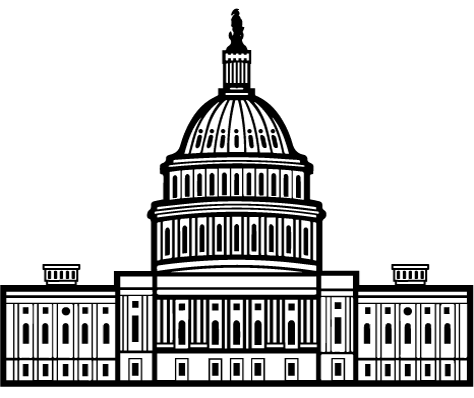
Last week, President Trump sent Congress his budget request for Fiscal Year 2019. The President's Budget Request (PBR) is only the first step in determining appropriations for the coming fiscal year. Over the next few months, Congress will also consider input from agency officials, constituents and other stakeholders as it assembles spending bills for FY 2019. However, Congress must first complete an FY 2018 spending package. Their work has been made easier by the recent passage of the Bipartisan Budget Act of 2018, which raises the overall spending caps for Fiscal Years 2018 and 2019, allowing appropriators room to finalize agency and program funding levels without deep cuts.
Details on relevant items of the FY 2019 PBR are captured below and links to useful documents follow.
| Agency/Office/Program, $ in thousands |
FY17 Final | FY18 President’s Request | FY18 House | FY18 Senate | FY18 Final | FY19 President’s Budget Request |
|---|---|---|---|---|---|---|
| Department of Defense, 6.1 Basic Research | 2,276,332 | 2,228,529 | 2,279,529 | 2,259,019 | 2,269,206 | |
| DOD, 6.2 Applied Research | 5,296,175 | 4,973,465 | 5,242,866 | 5,336,221 | 5,100,359 | |
| DOD, 6.3 Advanced Technology Development | 6,438,722 | 5,997,183 | 6,277,251 | 6,346,808 | 6,330,750 | |
| DOD, Total Science & Technology (6.1-6.3) | 14,011,229 | 13,199,177 | 13,799,646 | 13,942,048 | 13,700,315 | |
| Department of Education, Pell Grant | 22,475,352 | 22,432,600 | 22,475,352 | 22,475,352 | 22,475,352 | |
| DOEd., Pell Grant Maximum Award | 5,920 | 5,920 | 5,920 | 6,020 | 5,920 | |
| DOEd., Work Study | 989,728 | 500,000 | 989,728 | 989,728 | 500,000 | |
| DOEd., Supplemental Education Opportunity Grants | 733,130 | 0 | 733,130 | 733,130 | 0* | |
| Institute of Education Sciences | 605,267 | 616,839 | 605,267 | 600,267 | 521,563 | |
| Department of Energy, Office of Science | 5,392,000 | 4,472,516 | 5,392,000 | 5,550,000 | 5,391,000 | |
| DOE, Advanced Research Projects Agency Energy | 306,000 | 20 | 0 | 330,000 | 0* | |
| Environmental Protection Agency, Office of Science | 706,473 | 450,812 | 602,238 | 634,029 | 449,000 | |
| National Aeronautics and Space Administration, Science | 5,764,900 | 5,711,800 | 5,858,500 | 5,571,000 | 5,895,000 | |
| National Endowment for the Humanities | 149,848 | 42,307 | 145,000 | 149,848 | 42,000* | |
| National Endowment for the Arts | 149,849 | 29,000 | 145,000 | 149,849 | 29,000* | |
| National Institutes of Health, including funds to implement the 21st Century Cures Act | 34,084,000 | 26,920,000 | 35,184,000 | 36,084,000 | 34,767 | |
| National Oceanic and Atmospheric Administration, Oceanic and Atmospheric Research | 510,826 | 350,004 | 474,773 | 518,725 | 321,651 | |
| National Science Foundation | 7,472,215 | 6,652,888 | 7,339,525 | 7,311,083 | 7,472,000 | |
| National Institute of Standards and Technology, Manufacturing Extension Program | 130,000 | 6,000 | 100,000 | 130,000 | 5,000* |
*Agency/Program Termination Proposed
Agency Items of Note:
National Oceanic and Atmospheric Administration: The President’s Budget Request would cut NOAA Oceanic and Atmospheric Research by 37%. The PBR calls for a significant reduction to climate research. The NOAA Sea Grant program is proposed for elimination in the PBR.
Department of Defense: The PBR proposes a 19% increase to the Defense Advanced Research Projects Agency.
Department of Education: The PBR contains sufficient funds to maintain the current Pell Grant maximum award level of $5,920. Further, the document suggests expanding eligibility to “high-quality” short-term programs. The PBR suggests a nearly 50% reduction to the Federal Work Study program and would end graduate student eligibility. The document also proposes eliminating the Public Service Loan Forgiveness Program and subsidized Stafford Loans for undergraduate students.
The PBR proposes a reduction of 14% to the Institute of Education Sciences. Within IES, the PBR eliminates funding for the Regional Education Laboratories and the Statewide Longitudinal Data Systems programs.
Department of Energy: The PBR instructs the Office of Science to focus efforts on the early-stage research, operation of the national laboratories, and continuation of high-priority construction projects. The PBR calls for elimination of the Advanced Research Projects Agency Energy, as did the FY 2017 version.
Environmental Protection Agency: The PBR would cut the EPA Office of Science by 36.4%.
Health and Human Services: The PBR would reduce the HHS grantee salary cap from $187,000 to $152,000. Further, the proposal would cap the percentage of a scientist’s salary that could be paid from grants.
APLU President’s Budget Request Chart
President’s Budget Request for Fiscal Year 2019
Addendum to the Budget Request, Reflecting Bipartisan Budget Act of 2018

